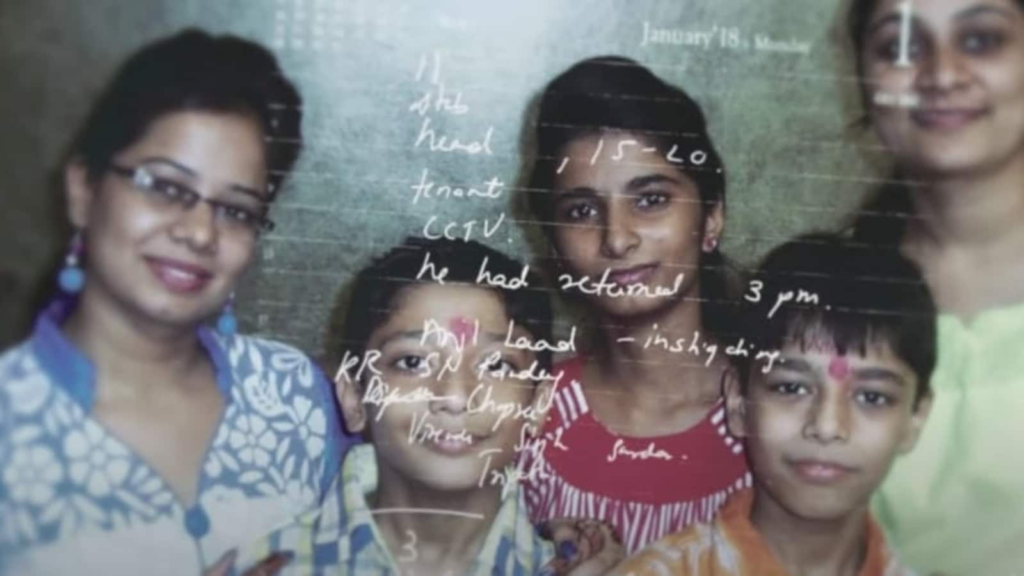
Police have launched an investigation into the deaths of a man and his four daughters in southwest Delhi’s Vasant Kunj area, with officials probing a possible occult angle. Authorities on Sunday said they will study the infamous 2018 Burari suicide case for parallels, as the mysterious circumstances surrounding the recent deaths have raised concerns.

Heera Lal Sharma, a 55-year-old carpenter, and his four daughters — Neetu (26), Nikki (24), Neeru (23), and Nidhi (20) — were found dead in their rented flat on Friday afternoon. Initial investigations suggest that the family may have taken their lives in a suicide pact.
During the initial forensic examination, investigators discovered red threads (commonly known as kalawa or Mauli) tied around the waists, hands, and necks of the four daughters, an unsettling detail that has led the police to examine whether any occult practices were involved.
Also Read | Mystery over Delhi family’s deaths deepens as new CCTV video emerges
A box of sweets was also recovered from the scene, further deepening the mystery.
“In 2018, 11 family members, blindfolded and mouth-taped were found dead at their residence in Burari area of north Delhi…Our teams will check the records of the Burari case to connect the dots of this suicide,” PTI quoted a senior police. official as saying.
Also Read | Reincarnation, rituals and religion: The unsolved mysteries of Burari deaths
In the Burari incident, the 11 victims were discovered blindfolded, with their mouths taped shut, and hanging in their home. The case shook the nation as evidence suggested the family had followed rituals for several days before their deaths, spurred by delusions of supernatural salvation.
According to police, Sharma had been struggling with emotional and financial difficulties since the death of his wife from cancer last year. After her passing, the family became increasingly isolated from the community.
“So far we got to know that Sharma had not spoken to anyone in the last nine months. He and his daughters were rarely seen outside. After his wife’s death, the family had disconnected from everyone,” the police officer told PTI.
Also Read | Mass suicide or mass murder? Burari family deaths still a mystery 3 weeks later
Sharma, who worked as a carpenter at the Indian Spinal Injury Center for 28 years, had not been to work since January.
Police found three packets of Celphos, a highly toxic poison, in the apartment, along with five glasses and a spoon containing a suspicious liquid. Sharma’s body was discovered in one room, while his daughters were found in another. There were no external injury marks on the bodies, officials said, and forensic teams are analyzing the poison to determine if it caused the deaths.
Investigators also recovered CCTV footage showing Sharma entering the house with a packet in hand two days before the bodies were found.
Sharma’s brother, Mohan, and sister-in-law, Gudiya, arrived at the flat after being informed of the incident. They revealed that Sharma had been deeply depressed since his wife’s passing and had devoted himself to caring for his daughters, two of whom were reportedly differently-abled.
The postmortems will be conducted on Monday by a medical board, according to Deputy Commissioner of Police (southwest) Rohit Meena.
“We will be able to tell the actual cause for death after the postmortem. We have formed multiple teams to know the reason behind suicide. We are also checking CCTV footage of the area and adjoining area to know with who Sharma had last spoken to and If he had shared anything with them. We are also checking mobile phones records of all the victims to know if they were in contact with anyone,” Meena said.
Police have initiated investigation proceedings under Section 194 of the Bharatiya Nagarik Suraksha Sanhita (BNSS), India’s updated criminal procedure code.







